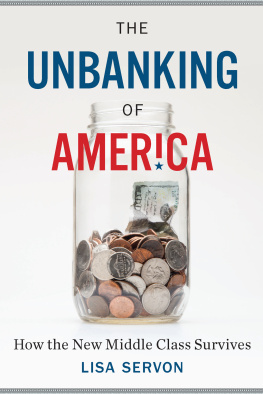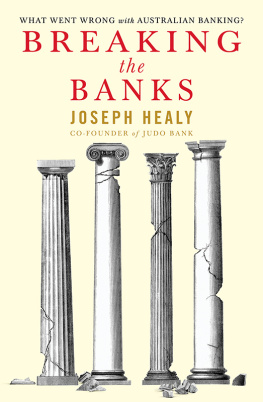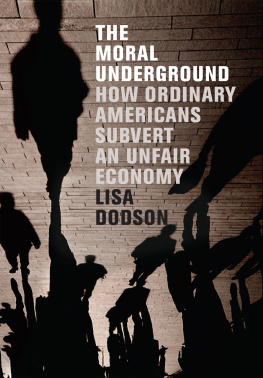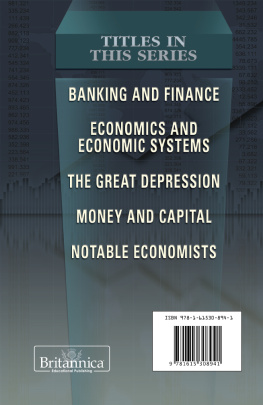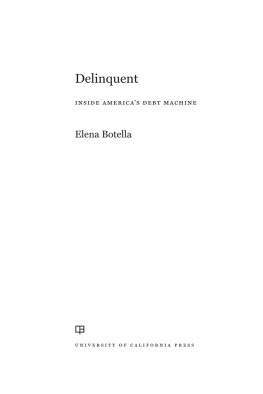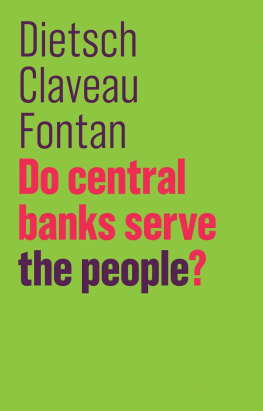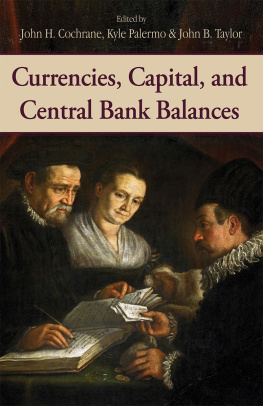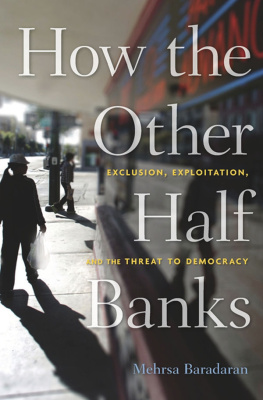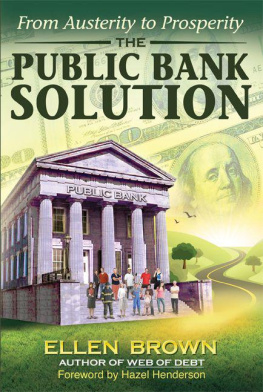Copyright 2017 by Lisa Servon
ALL RIGHTS RESERVED
For information about permission to reproduce selections from this book, write to or to Permissions, Houghton Mifflin Harcourt Publishing Company, 3 Park Avenue, 19th Floor, New York, New York 10016.
WWW.HMHCO.COM
Library of Congress Cataloging-in-Publication Data is available.
ISBN 978-0-544-60231-1
Cover design by Martha Kennedy
Cover photograph by Guy Jarvis
e ISBN 978-0-544-61118-4
v1.1216
For C.C. and Milo
Not everything that counts can be counted,
and not everything that can be counted counts.
WILLIAM BRUCE CAMERON
Introduction:
Were All Underbanked
Growing up in South River, New Jersey, in the late 1960s and early 70s, I went to our local bank, Pulaski Savings and Loan, with my father as part of his Saturday errand ritual. Wed start out at the post office to mail the bills, stop in at Mike the butchers shop to buy meat for the week, and then head to Pulaski Savings and Loan to deposit my fathers check and take out some cash. I also went to the bank with my mother on the way home from school on Friday afternoons, sitting in the passenger seat of our 1976 Ford Elite while she cashed her teachers paycheck at the drive-through. She deposited most of her pay, which my father would draw on to take care of the bills, and kept an envelope with a small amount of cash that she used to pick up milk and bread and pay for school field trips and the occasional treat until the next payday.
My parents opened my first savings account for me when I was seven. The teller gave me a green Pulaski passbook with gold lettering. It made me feel important, like Id crossed some threshold and joined a club that bigger kids and grownups got to be a part of. I brought the passbook to the bank to deposit birthday checks from my grandparents and, later, babysitting money.
Growing up, I watched my parents write checks to pay the bills and use cash to buy groceries, clothes, and the infrequent meal out. I now realize that they were training me to become a particular kind of financial consumer. Their role modeling was critical, as were their expectation that I would go to college and their assumption that, by doing so, Id get a job that would support me.
When I got my first job cleaning hotel rooms at the age of fourteen, I deposited my paychecks at Pulaski. Using the bank to manage my money still felt more like fulfilling an expectation than making a choice. In the early 1980s I moved away from home to go to college. I opened an account near campus without thinking much about it. Thats what all my friends did. I didnt even know other options existed.
My parents didnt get a credit card until after I had left home, and I got my firstan American Express cardin 1987, the year after I graduated from college.
The world has changed. These days I do most of my banking online at odd hours. For my children, going to the bank means popping over to the nearest ATM to get cash. And on the rare occasion when I need to visit the teller window, I dont recognize any of the bank employees, and they dont know me. Today banks are bigger and more expensive to use, and their products are harder to understand. Theres a lot more fine print than there used to be. In addition, all kinds of new financial products and services have become available. Many are coming not from banks, but from entrepreneurs who are harnessing technology, information, and the current moment in ways that are disrupting the entire financial-services industry.
The result? Banks are now catering more and more to the well-off, leaving the rest of us to pay too much at banks or to settle for imperfect alternatives such as check cashers and payday lenders. Check cashers enable people, for a fee, to cash checks, purchase money orders and prepaid debit cards, wire money, and pay bills. Payday lenders provide small short-term, high-cost loans.
As a university professor who studies financial services, I wanted to understand why people were leaving banks and using alternative financial-services providers when policymakers and consumer advocates were so convinced that this was a poor decision. I knew I could get only so far by reading policy reports and academic articles in my university office. So I got a job as a teller at RiteCheck, a check casher in the South Bronx, where I could get up close to peoples decisions. Before working as a teller, I assumed that mainstream and alternative financial services were separate. Like a lot of policymakers, I thought educated, middle-class people like me used banks and that poor people used check cashers and payday lenders. I figured that people who didnt use banks aspired to having a bank account, that becoming banked was part of the well-traveled path of upward mobility. That was my path. And thats what the news accounts, policy reports, and research had led me to believe. I soon learned that the reality is much more complicated.
The consumer financial-services systemthe large industry that consists of (1) mainstream banks, (2) alternative financial services (check cashers, payday lenders, pawnshops, and so on), and (3) informal practices such as saving in structured groups of friends or coworkersis broken. Over the past four decades, most particularly since the financial crisis of 2008, banking itself has morphed into a system that no longer serves the needs of far too many Americans.
What caused this breakdown? First, banking has changed. Starting in the late 1970s, bank failures, policies that enabled consolidation, and aggressive marketing of credit to a larger and riskier group combined to transform banks. They got bigger and they focused less on consumers. Meanwhile, alternative financial-services providers, such as check cashers and payday lenders, expanded to fill the gap. Second, many more Americans are dealing with chronic financial instability. Declining wages, increased income volatility, and the erosion of benefits, along with increased costs for health care, childcare, and education, make it harder to make ends meet. The one-two punch of these trends has left Americans in a dire situation. We lack safe, affordable financial products and services when we need them most.
In 2012 the Wall Street Journal reported that a large number of Americans left banks in the wake of the 2008 financial crisis. For some, the departure was a way of protesting the role banks played in a crisis that left them and their neighbors jobless or behind on their mortgages. Others felt as though they got less value from banks than they did before. Still others found that they couldnt afford banks rising fees. Between 2009 and 2013, the percentage of Americans with a checking account dropped from 92 percent to 88 percent, and the percentage with a savings account dropped from 72 percent to 68 percent.
A reader, responding to one of my articles, told the story of taking his young daughter to open a savings account. He was excited to begin her training as a saver and wanted to show her the magic of compound interest. (I remember the thrill of watching my own bank account growthe money I earned just by leaving it there.) We put in fifty dollars, my reader wrote, and I had the idea that once a month we would go to the bank and make a deposit. Then we would watch the money grow, along with interest. His plan didnt pan out. The next month we went back to make the next deposit, and lo and behold, there was only forty-five dollars in the account. Turned out that the bank was charging for low balances in savings accounts. End of lesson. The little girl was crestfallen and the father was angry. He got the bank to return the five dollars and closed her accountand his own.
Whether fed up with bank fees, like this reader, or lacking other options, many Americans have had it with banks. And the banks dont seem to care. If profits are your only concern, it doesnt make sense to provide savings accounts to children and other people who dont have much to save. It costs a lot for banks to collect small deposits. Theyre interested in providing these accounts only if they can cover their costs by charging fees. But the fees make it irrational for people to save. The result? A dearth of opportunities for people to save, a behavior considered important over the long term.
Next page
